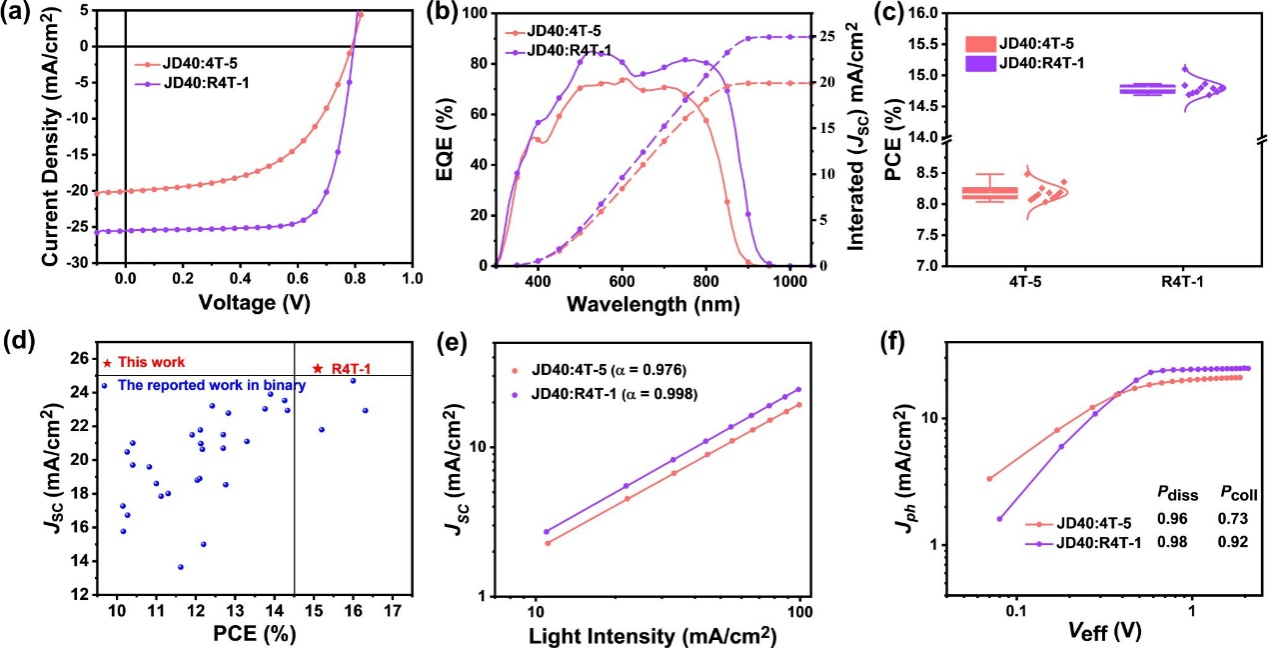Recently, Professor Song Jinsheng and his team at the Institute of Nanoscience and Engineering have made significant strides in the field of efficient, non-fused ring organic photovoltaic (OPV) materials design. The outcomes are detailed in the paper titled "Macrocyclic Encapsulation in a Non-fused Tetrathiophene Acceptor for Efficient Organic Solar Cells with High Short-Circuit Current Density," published in the prestigious international journal Angew. Chem. Int. Ed.


Organic solar cells, with their unique advantages such as lightness, transparency, and flexibility, have demonstrated broad applications in photovoltaic-integrated architecture, photovoltaic agriculture, and the Internet of Things. Thanks to the development of novel photovoltaic materials and optimization of device fabrication techniques, the efficiency of organic solar cell devices has surpassed 19% in recent years. However, commonly used star acceptor materials in the organic photovoltaic field often possess large π-conjugated systems, leading to increased synthesis complexity and costs, hindering their commercial applications. At present, completely non-fused ring electron acceptor materials with simple structures are expected to combine high performance and low cost into one, but there is still a lack of detailed molecular structure-photovoltaic performance structure-activity relationship research.
Addressing the need for high-performance yet cost-effective materials, Professor Jinsheng Song's research team focused on non-fused conjugated systems, particularly oligothiophenes. They constructed three- and four-linked thiophene frameworks to develop a series of fully non-fused electron acceptors (NFREAs) (Adv. Funct. Mater., 2021, 31, 2101742; J. Mater. Chem. A, 2023, 11, 7498-7504). Among them, the molecule 4T-3 exhibited outstanding photovoltaic performance and cost-effectiveness. However, its twisted molecular structure and multiple molecular conformations severely restricted the efficient charge transport channels, resulting in a lower short-circuit current density (JSC).
To address these challenges, the research team proposed a strategy for precise construction using covalent macrocyclic encapsulation for the design of NFREAs materials. They successfully synthesized the R4T-1 acceptor molecule. The single-crystal structure revealed that the covalently enclosed ring perfectly covered the molecular central skeleton, limiting single-bond free rotation, achieving skeleton planarization, and obtaining a stable single molecular conformation. This simple strategy for macrocyclic encapsulation of the thiophene framework yielded absorption comparable to complex multi-ring structures in the visible-near-infrared region, achieving tightly ordered molecular stacking. As a result, organic photovoltaic devices based on the designed simple four-linked thiophene (4T) achieved a breakthrough photovoltaic conversion efficiency exceeding 15%, with a JSC reaching 25.48 mA/cm2, which is the highest reported value among NFREAs materials to date. This "macrocyclic encapsulation" molecular design strategy not only obtained outstanding performance for FREAs materials, but also provided an ideal and precise molecular research model for in-depth and systematic studies of FNEAs. Moreover, this strategy is expected to simplify and practicalize organic photovoltaic materials, paving the way for real-world applications (Angew. Chem. Int. Ed. 2023, e202316495).
The first authors of the paper are Ph.D. candidate Shuaishuai Shen and the master's student Yu Mi (2019), with Professor Jinsheng Song as the corresponding author. This work received substantial support from various projects, including the National Natural Science Foundation, Henan Provincial Distinguished Youth Fund, Central Thousand Talents Program, Henan Provincial University Basic Research Program Key Scientific Research Special Project, and the startup funds of Yellow River Scholars at Henan University.
Team Overview: Since joining Henan University in 2012, Professor Jinsheng Song has led four approved projects from the National Natural Science Foundation, receiving accolades such as the Henan Provincial Distinguished Youth Fund, Central Plains Outstanding Young Talent Support Program "Central Youth Top Talent," "Yellow River Scholar," Henan Provincial Education Department Academic Technical Leader, Henan Provincial High-Level Talent, and Henan Provincial Youth Science and Technology Education Precise Service Pilot Expert. His research primarily focuses on novel organic conjugated materials, organic solar cells, flexible electronic devices, and conjugated polymer chemistry. Professor Song has published over 60 SCI papers in journals such as J. Am. Chem. Soc., Adv. Energy Mater., and Adv. Funct. Mater., obtained three patents, and collaborated with domestic and international scholars on co-authoring a book in the field of solar cells.

 Research /
Research Achievements /
Science & Technology /
School of Chemistry and Molecular Sciences /
Content
Research /
Research Achievements /
Science & Technology /
School of Chemistry and Molecular Sciences /
Content


